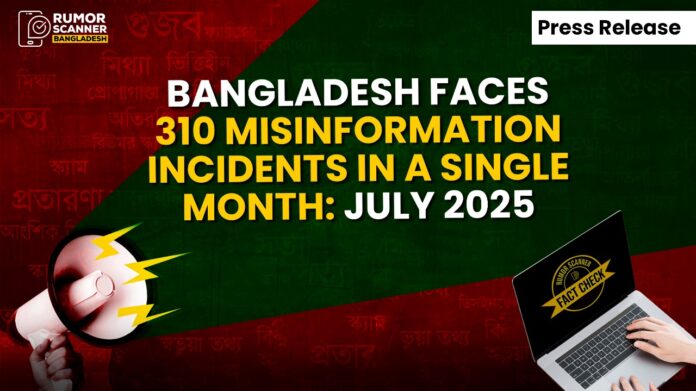In July of this year, the Bangladeshi fact-checking organization Rumor Scanner identified 310 pieces of misinformation spreading across the internet. A calculation based on fact-checks published on Rumor Scanner’s website last July shows that the majority of these falsehoods, a staggering 184 cases or about 59%, were related to political issues. In July, a variety of misinformation was identified across several topics. There were 61 instances of misinformation related to national issues, while 15 instances were found in the realm of entertainment and literature. Religious matters accounted for 13 instances of misinformation, and international topics had 11 instances. Additionally, there were seven cases of fraud-related misinformation, six instances in education, and five each in both sports and environment/climate. The report also identified two instances of misinformation in science and technology and a single case related to health.
The most common form of misinformation was video-centric, with 171 cases. Text-based misinformation followed with 82 cases, and image-based falsehoods with 57. Of the total identified misinformation, 221 cases were categorized as false, 38 as distorted, and 51 as misleading.
Facebook was the top platform for spreading misinformation last month, with 295 cases. Misinformation was also found on Instagram (139), YouTube (75), X (44), TikTok (52), Threads (at least seven), and Telegram (at least one). Even national media outlets were not exempt, as Rumor Scanner found evidence of misinformation being spread in multiple media outlets in 16 separate incidents.
While communal disinformation centered on Bangladesh has been a topic of discussion for several months, it has recently shown a slight decline. However, Rumor Scanner observed a resurgence in July, identifying 10 instances of such disinformation. In seven of these cases, the disinformation was found to have been spread on social media by accounts and pages with Indian identities.
Rumor Scanner’s team observed that three pieces of misinformation related to the current interim government were spread last month. To analyze these, Rumor Scanner categorized them into two types: “positive” for misinformation that favors the government and “negative” for that which opposes it. The organization found that in 75% of these cases, the government was portrayed negatively.
In July, 11 pieces of misinformation were spread about the interim government’s Chief Adviser, Dr. Muhammad Yunus, all of which were negative. Additionally, one piece of negative misinformation was identified involving adviser Jahangir Alam Chowdhury, two negative ones involving Asif Mahmud Sajib Bhuiyan, and one negative falsehood each for Dr. Salehuddin Ahmed, C. R. Abrar, Farooq-e-Azam, and Bidhan Ranjan Roy Poddar.
Discussions about the 13th National Parliament Election are ongoing everywhere. While disinformation related to the election had been on the rise in recent months, it saw a significant decrease last month, with only six cases identified, compared to 28 in the preceding month.
Analyzing the fact-checks from last month, Rumor Scanner found that the Bangladesh Nationalist Party (BNP), its affiliated organizations, and its leaders were the targets of the most disinformation (38 cases) among currently active political parties. Of these, 21 cases targeted the BNP as a party, with nearly 90% creating a negative impression. The party’s acting chairman, Tarique Rahman, was the subject of three cases of disinformation (66% of which were negative), while its student wing, the Bangladesh Jatiyatabadi Chhatra Dal, was targeted with six cases (83% of which were negative).
Following the BNP, the Bangladesh Jamaat-e-Islami, its affiliated organizations, and leaders were targeted with the second-highest amount of disinformation (35 cases). Of these, 23 cases targeted Jamaat as a party, with 87% creating a negative impression. The party’s student wing, the Bangladesh Islami Chhatrashibir, was targeted with 10 cases, all of which were negative.
In July, Rumor Scanner identified 34 cases of disinformation targeting the National Citizens Party (NCP) and its members. Of these, 21 cases were aimed at the party itself, and all of them were found to have created a negative impression. The party’s convenor, Nahid Islam, was the subject of three negative disinformation campaigns. Additionally, other party leaders were targeted with negative disinformation: Hasnat Abdullah (four cases), Sarjis Alam (three cases), Tasnim Zara (two cases), and Nusrat Tabassum (one case).
Meanwhile, the banned Bangladesh Awami League, its affiliated organizations, and members were the subject of 47 disinformation campaigns in July. Fifteen of these cases were about the party itself, with 87% of them creating a positive impression. The party’s president, Sheikh Hasina, was targeted with 17 pieces of disinformation, and 94% of these were positive. The party’s student wing, the Bangladesh Chhatra League, was also targeted with 10 cases of disinformation, 60% of which were positive.
State forces are not immune to the wrath of misinformation. Rumor Scanner observed 26 instances of misinformation spread about the Bangladesh Army last month, including five targeting its chief, General Waker-uz-Zaman. This marks the highest number of misinformation detected against the army in a single month since August of last year. Additionally, Rumor Scanner identified 13 pieces of misinformation related to the Bangladesh Police, 11 about the Bangladesh Air Force, one about the Bangladesh Navy, and three about the RAB.
An analysis of last month’s misinformation revealed a record number of fake content created with artificial intelligence, with 68 cases—the highest for a single month this year. Two deepfake videos were also identified during the same period.
Bangladesh witnessed five major events or issues in July that saw a significant flow of misinformation: the murder of scrap dealer Sohag in Dhaka on July 9, the NCP’s procession in Gopalganj on July 16, a Jamaat rally in Dhaka on July 19, a strike called by four Awami League organizations on July 20, and the air force plane crash in Dhaka’s Uttara on July 21. The plane crash in Uttara generated the most misinformation, with 39 cases. This was followed by the NCP procession in Gopalganj (38 cases), the Sohag murder (19 cases), the Awami League’s strike (12 cases), and the Jamaat rally (four cases).
The use of fake media names, logos, headlines, and counterfeit photo cards to spread misinformation appears to be decreasing. Last month, this method was used in 20 incidents to spread 21 pieces of false information involving 15 domestic and international news outlets.
Issued by
Tanvir Mahatab Abir
Senior Fact Checker,
Rumor Scanner Bangladesh






